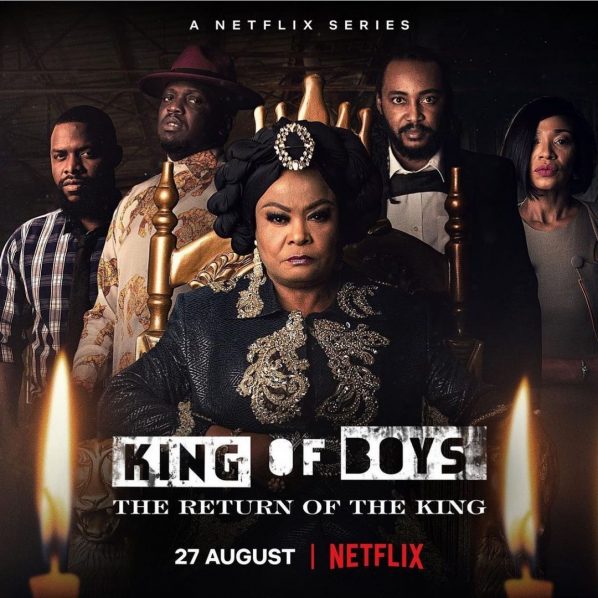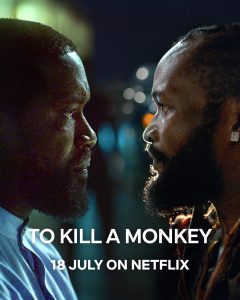
“King of Boys: The Return of the King not only offers a thrilling storyline of crime and power tussle.
The near-perfection of its acting, editing and screenwriting makes it an uncontestable A+ Nigerian television series possessing the quality of consumption in other foreign countries.
Its exposition of power hierarchy, betrayal and vulnerability is well-crafted, leaving very little room for flaws while underscoring that politics is always a game, and the game is usually won by the strongest, the dirtiest and the most feared.
It stays unapologetic about its presentation of these truths.
Following the massive success of Kemi Adetiba’s “King of Boys”, fans literally had to pressure her to make a sequel of the film. To surprise them, rather than making a sequel, she turned it into a series.
But did the series really do justice to their expectations?
Let’s do a little review:
Episode 1: A KING’S WELCOME
Before the series was released, a friend told me that the only way Alhaja Eniola Salami could come back to Nigeria was if she got a “presidential pardon”.
It really didn’t sit well with me.
Alhaja Eniola Salami did not get a presidential pardon but was cleared of all charges. We were left to guess how she got it but considering her power and status, we know this is not an impossibility.
“A king’s welcome” was a good opener and being a series, the episode didn’t launch straight into business. After 5 years in the United States, Eniola Salami has to grasp her reality.
The death of her two children begin to dawn on her.
The punishment she gave herself was an emotional and thrilling action scene and the way she wept at the burial ground, with young Eniola Salami (Character played by Toni Tones) haunting her, the action was on point.
However, while “A king’s welcome” was an introduction into new characters like “Odudu Bariba” and “Dapo Banjo”, these characters present a stereotypical pattern of Alhaja Eniola Salami’s contenders in “King of Boys” the prequel of the series.
Therefore, it can be inferred that “Odudu Bariba” is Aare’s and Makanaki’s replacement as street enemies while Jumoke Randle, being the only slightly different enemy in comparison to the rest is presented as not being as much as powerful as Alhaja Eniola Salami.
The question of whether she would be able to match up to Eniola Salami’s criminal standards arise and even though she tries to prove this at the end of episode 3.
It didn’t have to take that long to convince the audience about how powerful she is.
Dapo Banjo as the journalist who is hell bent on exposing the secret behind Alhaja Eniola Salami’s freedom is supposed to be Gobir’s replacement?
And while Gobir suffered family crisis, he should suffer family crisis too because he is a journalist?
We get that Kemi Adetiba wants the viewers to know more and care a little about Dapo, but The obviousity of the pattern is a little uninteresting. It would have helped that we knew the reason it was doing it all rather than learning it towards the end of episode 3.
Episode 2: “A wounded lion is still a lion”
Alhaja Eniola Salami, after being embarrassed by the Iyaloja and Reverend, seemed to not be entirely affected by it and while Ade Tiger is trying to tell them they need to strike back and caution “Ododu Bariba”, she is calm, probably thinking and scheming.
This makes the point of the episode. Alhaja Eniola Salami, though embarrassed and insulted, is still Alhaja Eniola Salami.
The introduction of Remi Mofe Damijo as the Reverend brings an uncanny humour to King of Boys: The Return of the King.
Seeing RMD play this role is funny because not only is he very good at playing the role, he does it too convincingly and this makes viewers wonder if this was not the same man in “Love is War”. Kudos to Kemi Adetiba on the casting.
May we also take this moment to give Toni Tones all the applause she deserves? Her acting is on point and never do we not look forward to her scenes or get thrilled by her.
However, Episode 2 offers even less intensity than episode 1. It is at this episode that we see Jumoke Randle show her power and scheme of getting the Reverend to their side and outshining Alhaja Eniola Salami at the market place, but even all her “powers” slightly pale into insignificance in comparison to Eniola Salami.
To be honest, the whole point of the thrill about King of Boys is its sustained intensity and when it pauses a little to narrate to the audience.
it is practical, but still a little short of viewer’s expectation. It doesn’t have the magic of King of Boys for that short pause, but becomes another conventional movie discussing the tussle of power among politicians.
Episode 3: “An Old Enemy”
This is one of the best episodes of the series. The reason being that Kemi Adetiba gets very realistic in creating a human side of Alhaja Eniola Salami and not presenting her as an invulnerable criminal who knows how to scheme, kill and take revenge without feeling anything.
In this episode, Alhaja Eniola Salami makes confessional statements. She admits “I am getting old. I am getting tired”. She tells the Reverend unabashedly that all her life, she knows to “Steal, kill and destroy” and with sincerity of heart, she seeks redemption from God.
Kudos to Kemi on this creative twist. It couldn’t have gotten better than that.
Kemi also used the case of Eniola’s campaign team wanting to get her engaged so as to prove to people that she is “settled” as an emphasis that women do not need men to succeed since having a wife is not a criterion as success for men, then why should there be a double standard? Here, Kemi subtly inserts a theme of gender inequality.
We see Eniola use her power to cross-carpet to the President’s power and this is the kind of Eniola we have been waiting to see. Makannaki’s arrival at the end makes the point of the episode.
Episode 3 has very little flaws. It gets as real and realistic as possible. The only thing is the slight confusion of the party where a guy was hit on the head by the girl he’s obsessed with.
For a moment, we are left hanging with the meaning of that scene until we see that the girl captures him for Makananki.
That subtractive part takes away the power of suspense Adetiba must have wanted to use in that scene.
Episode 4: “The Devil’s revenge”
In Episode 4, we see Makanaki punish those that betrayed him with death. It is good to see that he still has his delvish humour. Even in the process of killing his betrayers, the scene is still funny. It is almost impossible not to laugh.
One of the things that make Kemi Adetiba’s “King of Boys: The Return of the King” near perfection is her in-depth presentation of Eniola Salami. Eniola is presented as an orphan who had to fight her way through life. What’s more? She has the perfect response for everyone who tries to spite her.
Since she arrived at the airport and the reporter (Character played by Osas Ighodaro) asked her why she came back seeing she lost everything. Eniola Salami’s reply made us and the reporter mouth-opened.
The way she adroitly replied Dapo Banjo has to be one of the most analytic depiction of Eniola Salami as a ready-made politician who is not determined by only the people around her but by how wise life has made her.
If anything, Kemi Adetiba did a careful Job on the scripting of this series. A good script makes a good movie. A wonderful script makes an excellent movie. King of Boys: The Return of the King” has wonderful scripting.
Episode 4 focuses more on the evolution of Jumoke Randle into a more worthy enemy for Alhaja Eniola Salami. After she tries to outshine her at the market and offer her money, Jumoke Randle is ready to “kill” to eliminate her “husband’s threat”.
It is only at this point that viewers begin to see her as a real threat to Eniola Salami, something that should have been adequately conveyed since the beginning of the series.
It gets even better when we see the casting of the mother of Governor Randle, someone who is far more powerful and orders Jumoke Randle to beg her for help.
The power structure cannot be underemphasized and Kemi Adetiba proves this by saying that truly, Jumoke may want to destroy Alhaja Eniola, but she does not have enough means to do so. Like Alhaja Eniola said before “A shey o kere”
The ending of episode 4 witnesses Jumoke Randle’s rise into the criminal world, if she isn’t in it already. Like Episode 3. Episode 4 has very little flaws also. In fact, it has next to no flaw in comparison to Episode 3
Read: Adamasingba stadium commissioning today, hosts Slovenian team
Episode 5: “Walls closing in”
Episode 5 sees Alhaja Eniola Salami making an ally of Gobir and ignoring demands of a table meeting.
The episode focuses on Alhaja Eniola accepting reality; that she cannot try to run for Governor and rule the table too.
Odogwu Malay’s “betrayal” is realistic, considering g that he did almost everything to get the attention of the “King of Boys”, and Makanaki’s reconciliation with his first love; visiting a babalawo, is very thrilling.
What’s KOB without some juju?
Episode 5 would have been a perfect episode but the person who has Ade Tiger in her “grasp” because he worked for Aare does not really interest the viewers. I mean, “Why hide her face throughout the scene?” suspense? The effect is not felt.
It only takes away the intensity of the scene as we have to wonder, (without caring much) who she is rather than focusing on the intensity of the scene and Ade Tiger’s new situation and what Alhaja Eniola Salami would do to him if she knew.
In comparison, the bomb blast at the Conscience Paper is the kind of suspense that works in KOB. It is a classic KOB scene as we are left wondering if Ade Tiger did it alone or on orders of Alhaja Eniola.
This same style should have been employed in Ade Tiger’s encounter with the “mystery lady”
Episode 6: “Trouble Sleep”
Episode 6 is literally the perfect episode in the series. We see a re-evolution of Alhaja Eniola Salami, consequent on the betrayal she faced by Boxer.
Episode 7: “The handover Ritual”
Episode 7 is a wonderful episode but it felt like the conclusion was rushed. It didn’t matter that it was one hour long.
Most of the details in Episode 7 were just introduced and were not expounded to the views before. In “King of Boys: The Return of the King”, Kemi Adetiba was taking us on a journey.
But after Episode 6, it felt like she dropped viewers off somewhere and picked them back leaving them to wonder what happened when she was gone.
Read: Nigerian artists with highest monthly listeners on spotify (September 2021)
“Why were we not shown the scene of where Dapo Banjo’s Boss was threatened? It would take a lot of threat to make that man ruin Dapo’s life considering that he was like a father-figure to him.
It didn’t help enough that he was not just strong-willed.
Viewers were not fully convinced when they saw him saying those things against Dapo on National Television. Did he break easy?
How exactly did he get Dapo’s picture with Jumoke Randle in the Governor’s house? Do they have an ally in the government house?
These questions are left hanging in the air.
One of the most painful of these sudden scenes, is the handover scene. This is supposed to be the most thrilling scenes for viewers, and believe me, it was astounding but it had some shortcomings.
Didn’t Ade Tiger really work for Aare? How exactly did Alhaja Eniola Salami get together with Makanaki not only to speak to him but for them to reach an agreement?
The last we recall, in Episode 4, he counted Alhaja Salami as his enemy that should die. He could just have killed her instead. Besides, didn’t she try to have him killed in the prequel of the movie where he lost one of his eyes?
Our intelligence is put to question with the rushed portrayal of these scenes. The explanations were just not enough. The conventional “show and tell” would have been the best tool to present these events.
Asides these, the acting in Episode 7 was top notch! The death of Odogwu Malay was just in time and the way he died was not at all disappointing considering that he was killed by Makanaki. The fight scenes at the Handover Ritual was amazing and Jumoke Randle ending at Ajah? Poetic Justice.
With all being said “King of Boys: The Return of the King not only offers a thrilling storyline of crime and power tussle. The near-perfection of its acting, editing and screenwriting makes it an uncontestable A+ Nigerian television series possessing the quality of consumption in other foreign countries.
Its exposition of power hierarchy, betrayal and vulnerability is well-crafted, leaving very little room for flaws while underscoring that politics is always a game, and the game is usually won by the strongest, the dirtiest and the most feared. It stays unapologetic about its presentation of these truths. Kemi Adetiba did not disappoint.
Screenwriting: 2/2
Acting: 2/2
Editing: 1.6/2
Casting: 1.7/2
Satisfaction: 1.7/2
☆Total: 9/10
Thoughts? Let us hear them in the comment section!
Go to home








